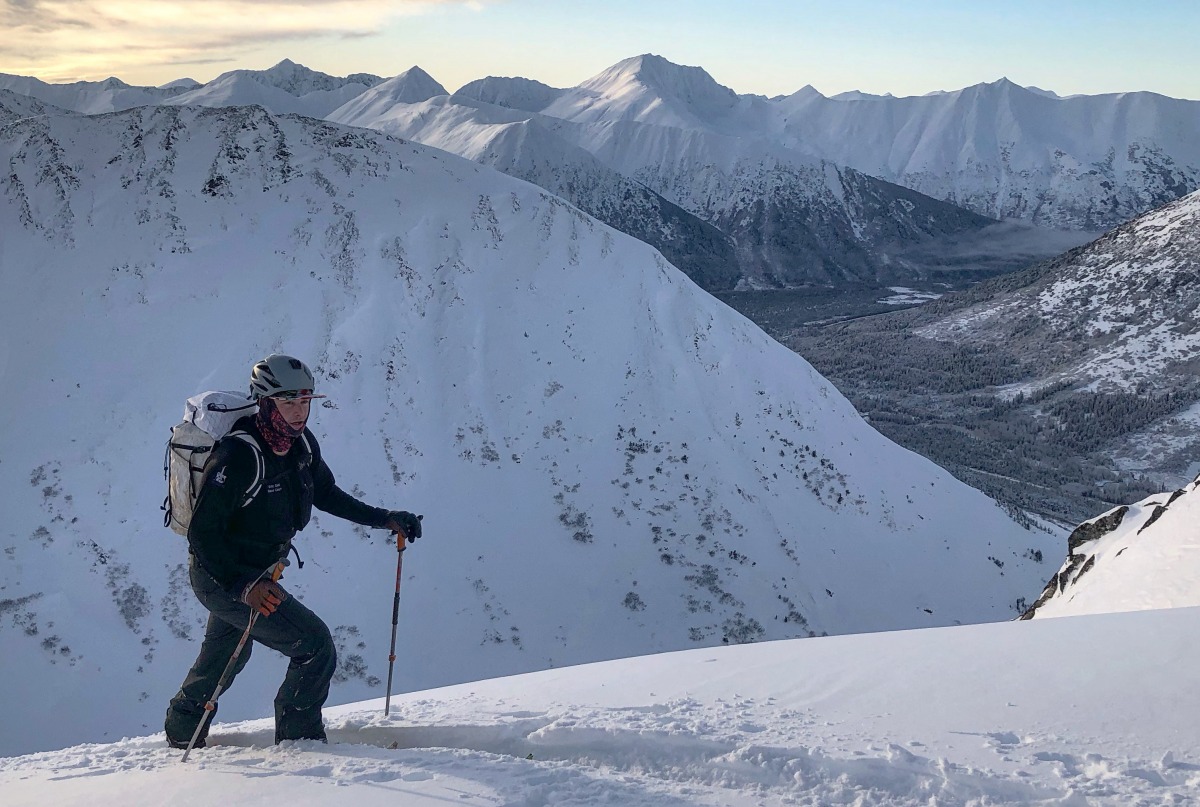Rounding out our green week coverage are a few light-hearted thoughts from long-time WildSnow contributor and environmental philosopher Alex Lee.
How to be a Chionophile in a Warming World
A chionophile, from the Greek meaning “lover of snow,” is any organism that thrives in harsh winter conditions. They include snowy owls, caribou, musk ox, various tundra lichens, and of course backcountry skiers. The past couple weeks in Alaska have seen temperatures barely break 0, and after a few ski tours below -20 I feel I have been thoroughly vetted. As we are solidly in the heart of winter, it is tempting to forget about the 90 degree days Anchorage saw this past summer. Last week, both NASA and NOAA officially announced 2019 was the second hottest year on record, rounding out the warmest decade on record. I fear the respite of winter clings to mountains with increasing desperation. I love snow; I love the winter world and what it brings out in people and places around me. Alas – what is a chionophile to do?
Self serving reasons aside, we in-debt ourselves to mountains in exchange for open access to our white winter canvas. The backcountry community has both a unique responsibility and unique perspective on climate change that can be part of building solutions. Whether it be apathy or paralysis, it is easy to push the problem out of our lives. Instead, let’s do something about it.
Here’s five (easy) things the backcountry community can do.
1. Talk about it
“How was the snow?” “Is the skinner in?” “Facets?” “Did Chad go full TGR?”
…Get two skiers in a room and what are they going to talk about? Skiing, duh. Let’s talk about climate change too.
Talking about climate change creates urgency, shares information, and offers a space for creativity around climate action. Share ideas, news articles, and local actions with your community.
2. Explore your backyard
Okay, I am literally writing this in an airport on my way to Rogers Pass, but bare with me….
A yurt trip in your local backcountry can be just as fun as trips to far off places. Staying local not only reduces your carbon footprint, but is also cheaper, avoids the fickle problem of planning out trips months before you know the conditions, and lets you get to know your backyard in new ways. Now, I am not saying never leave home, just consider when the carbon is worth the squeeze. If you are able to do so, also consider paying a bit more for fewer connecting flights (take-offs and landings burn the most jet fuel).
…Also, if you are a WildSnow writer hypocritically blogging about traveling less while waiting to get on a fuel burning flying piece of metal, you could always think about offsetting your travel.
Embrace personal steps.
3. Observe
We spend our free time in places few others ever go.
We know how the glaciers and mountains change. We see the white snowshoe hares when we head out on rock skis with the ground still mostly brown. We remember the deep years and thin years. Not only can we be citizen scientists, but we have a story to tell as a community. The chionophile tales are a valuable part of the climate change narrative.
Even reflecting personally on the non-skiing parts of ski touring just might change your perspective. Personal observations make environmental change personal too.
4. Support
Protect Our Winters (POW) has done an incredible job of building a conversation in the winter sports world. Local and national environmental organizations push for meaningful action on climate change, as well as work to protect public lands, conserve wildlife, and maintain access. Support these efforts. This might mean a donation, but it could also mean liking posts on Instagram, going to local events, signing letters of support to politicians, and getting involved.
Don’t wait for a perfect climate solution before you start engaging in efforts to get the ball rolling.
5. Ski
In the words of Ed Abbey, “it is not enough to fight for the land, it is even more important to enjoy it. While you can. While its still here.”
Ski – it’s an expression of freedom, it’s fun, it’s a beautiful culmination of the human spirit. The more we can make an inclusive, diverse, and expansive backcountry community, the more we will spread the stoke to others too-after all, people protect what they love.
Get outside and get others outside too – the world will be a better (and maybe even colder) place.
Dr. Alex Lee is an environmental philosopher, writer, teacher, adventurer and long time WildSnow contributor.
Dr. Alex Lee lives in Anchorage, Alaska. Alex is a professor at Alaska Pacific University, teaching philosophy and environmental studies. He also works as a sometimes guide, naturalist, writer, and photographer.

